Sports
Meet the trans athletes
From golf to dodgeball, out competitors helping to change the rules
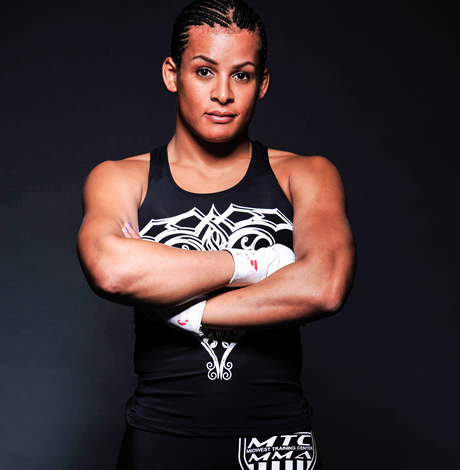
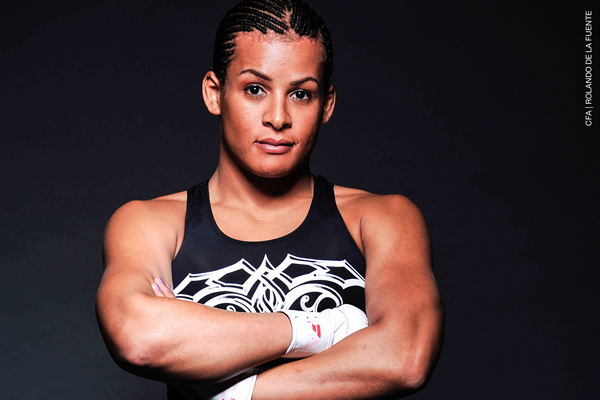
Fallon Fox (Photo by Rolando de la Fuente; courtesy CFA)
The United States has an estimated transgender population of 700,000 people, according to UCLA’s Williams Institute.
What this means for the sports community is that the standards and rules that have been put in place by the many different sports need to include provisions enabling transgender people to participate according to their proper gender identity.
Organizations such as the National Collegiate Athletic Association (NCAA), the International Olympic Committee, the Ladies Professional Golf Association and the United States Soccer Federation have all adopted such policies.
Many of the policies adopted by the governing sports bodies require surgical or hormonal treatment verification prior to competitions. This creates economic barriers for the athletes due to high surgical costs, which are rarely covered by insurance carriers.
Interscholastic athletics are governed by state athletic associations and each of the 50 organizations must put in place their own polices. To date, several have adopted a wide range of policies, not all of which are as inclusive as they should be.
What we have been seeing too often is that the rules are not being followed and the trans athletes are being subjected to discrimination.
Below is a list of just a few of the trans athletes who are competing openly and that have received the permission required from their sports’ governing bodies.
Schuylar Bailar. While he was in high school in McLean, Va., Bailar was recruited by the Harvard women’s swim team. Now 19, he took a year off to transition and subsequently received an invitation to swim on the Harvard men’s team this fall. The governing body for Harvard sports is the NCAA, which has a recommended policy, but each individual school adopts its own policy.
Fallon Fox. After some initial struggles with licensing and discrimination, Fox is competing in mixed martial arts (MMA). Originally from Toledo, Ohio, her last match was the Prize Fighting Championship 10 in Denver on Aug. 14. Licensing is state-run and she has been promoted in the past by the Championship Fighting Alliance.
Chris Mosier. Mosier is from Chicago and is the executive director of GO! Athletes. He is also the founder of transathlete.com. He recently qualified to represent Team USA at the 2016 Duathlon World Championships in Spain in the men’s 35-39 category. The governing bodies are USA Triathlon and the International Triathlon Union.
Gabrielle Ludwig. In 2012, in the middle of a debate over transgender legislation in California, Ludwig returned to the sport of basketball at age 51 by joining the Mission College of Santa Clara team where she played for two years. The 6’6” Ludwig grew up in Wyoming and New York and is a Desert Storm veteran. Assembly Bill 1266 went into effect on Jan. 1, 2014 and requires that California schools respect the gender identity of all students and allow them to participate in all activities, including sports.
Ryland Whittington. Whittington is from San Diego and was diagnosed as deaf at 13 months old in 2009. After receiving his cochlear implants at 19 months, he began communicating to his parents that he identified as a boy. Because he lives in California, he will be allowed to play soccer with no barriers. The sport’s governing body is the California Interscholastic Federation.
Savannah Burton. Burton is originally from Corner Brook, Newfoundland and Labrador in Canada and rowed with another trans teammate in the Canadian Sculling Marathon in 2014. This year she was one of eight women selected to compete for the Canadian national team for the World Dodgeball Championships that were just held Aug. 15-16 in Las Vegas. Her impact has affected multiple sports bodies, including Team Canada, the Canadian Dodgeball Association and the World Dodgeball Federation.
Jazz Jennings. Florida-born Jennings is a 14-year-old YouTube celebrity, spokesperson, LGBTQ activist and athlete. She and her family fought for more than two years for her to be allowed to play on the local girls’ soccer team. The United States Soccer Federation stepped in and created a trans-inclusive policy for youth and adult recreation soccer players of all ages that required the Florida soccer league to allow Jennings to play.
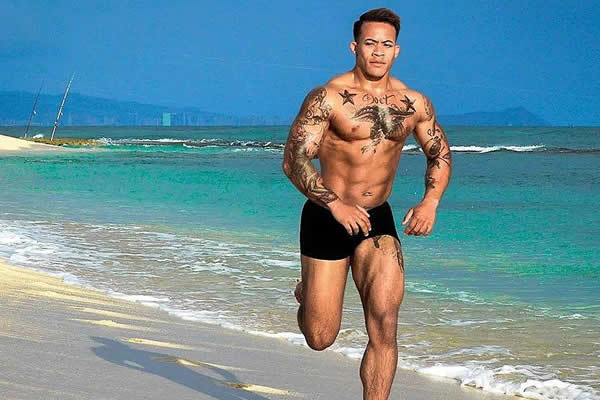
Sgt. Shane Ortega (Photo courtesy ACLU)
Shane Ortega. Ortega is active duty Army and competed in his first physique competition in Honolulu in June where he qualified for junior nationals. At his second competition this September, the Paradise Cup, the 28-year-old will attempt to qualify for nationals. Ortega is stationed in Hawaii and grew up on military bases around the country as well as with family while his mother was deployed. His participation was approved by the National Physique Committee.
Dr. Bobbi Lancaster. Hailing from Chatham, Ontario and residing in the Phoenix area, Lancaster is pursuing a spot on the Ladies Professional Golf Association (LPGA) tour. At age 64, she is currently playing on the Cactus Tour, which serves as a gateway to the LPGA. In 2011, the LPGA’s membership voted to join other sports bodies, including the International Olympic Committee and USA Track and Field, in eliminating the “female at birth” clause from its constitution.
Matt Dawkins. Dawkins, 17, will be a senior at Cherokee High School this fall in Marlton, N.J. He competed in his first meet on the boys’ track team in April and won his heat in the 100. His time was sixth best among 19 Cherokee boys. He is protected by the New Jersey State Interscholastic Athletic Association’s transgender policy.
Pat Griffin contributed to this report. A list of transgender athlete inclusion policies can be found at transathlete.com.
Sports
Bisexual former umpire sues Major League Baseball for sexual harassment
Brandon Cooper claims female colleague sexually harassed him

A fired former umpire is suing Major League Baseball, claiming he was sexually harassed by a female umpire and discriminated against because of his gender and his sexual orientation.
Brandon Cooper worked in the minor league Arizona Complex League last year, and according to the lawsuit he filed Wednesday in federal court in Manhattan, he identifies as bisexual.
“I wanted my umpiring and ability to speak for itself and not to be labeled as ‘Brandon Cooper the bisexual umpire,’” he told Outsports. “I didn’t want to be labeled as something. It has been a passion of mine to simply make it to the Major Leagues.”
But that didn’t happen. Instead of being promoted, he was fired. His suit names MLB and an affiliated entity, PDL Blue, Inc., and alleges he had endured a hostile work environment and wrongful termination and/or retaliation because of gender and sexual orientation under New York State and New York City law.
“Historically the MLB has had a homogenous roster of umpires working in both the minor and major leagues,” Cooper claims in his suit. “Specifically, to date there has never been a woman who has worked in a (regular) season game played in the majors, and most umpires are still Caucasian men. To try to fix its gender and racial diversity issue, defendants have implemented an illegal diversity quota requiring that women be promoted regardless of merit.”
Cooper claims former umpire Ed Rapuano, now an umpire evaluator, and Darren Spagnardi, an umpire development supervisor, told him in January 2023 that MLB had a hiring quota, requiring that at least two women be among 10 new hires.
According to the suit, Cooper was assigned to spring training last year and was notified by the senior manager of umpire administration, Dusty Dellinger, that even though he received a high rating in June from former big league umpire Jim Reynolds, now an umpire supervisor, that women and minority candidates had to be hired first.
Cooper claims that upon learning Cooper was bisexual, fellow umpire Gina Quartararo insulted him and fellow umpire Kevin Bruno by using homophobic slurs and crude remarks. At that time, Quartararo and Cooper worked on the same umpiring crew and being evaluated for possible promotion to the big leagues.
This season, Quartararo is working as an umpire in the Florida State League, one of nine women who are working as minor league umpires.
Cooper said he notified Dellinger, but instead of taking action against Quartararo, he said MLB ordered Cooper to undergo sensitivity training. According to his lawsuit, he was also accused of violating the minor league anti-discrimination and harassment policy.
Cooper’s suit says he met with MLB Senior Vice President of Diversity, Equity and Inclusion Billy Bean — who the Los Angeles Blade reported in December is battling cancer.
The lawsuit says at that meeting, Bean told the umpire that Quartararo claimed she was the victim, as the only female umpire in the ACL. Cooper said he told Bean Quartararo regularly used homophobic slurs and at one point physically shoved him. He also claims that he has video evidence, texts and emails to prove his claim.
But he said his complaints to Major League Baseball officials were ignored. His lawsuit said MLB passed him over for the playoffs and fired him in October. He said of the 26 umpires hired with Cooper, he was the only one let go.
Through a spokesperson, MLB declined to comment on pending litigation. Quartararo has also not publicly commented on the lawsuit.
Sports
Brittney Griner, wife expecting first child
WNBA star released from Russian gulag in December 2022
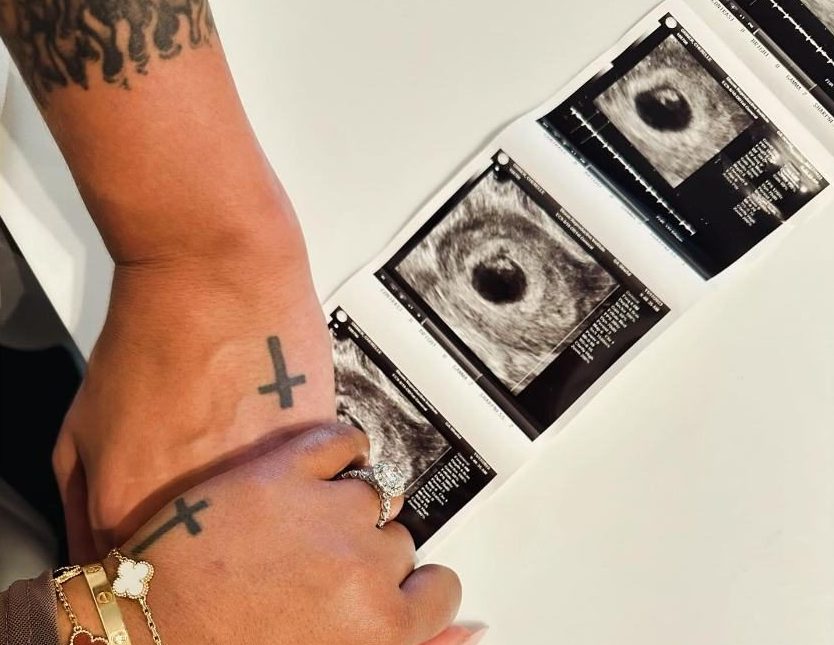
One year after returning to the WNBA after her release from a Russian gulag and declaring, “I’m never playing overseas again,” Phoenix Mercury star Brittney Griner and her wife announced they have something even bigger coming up this summer.
Cherelle, 31, and Brittney, 33, are expecting their first child in July. The couple shared the news with their 715,000 followers on Instagram.
“Can’t believe we’re less than three months away from meeting our favorite human being,” the caption read, with the hashtag, #BabyGrinerComingSoon and #July2024.
Griner returned to the U.S. in December 2022 in a prisoner swap, more than nine months after being arrested in Moscow for possession of vape cartridges containing prescription cannabis.
In April 2023, at her first news conference following her release, the two-time Olympic gold medalist made only one exception to her vow to never play overseas again: To return to the Summer Olympic Games, which will be played in Paris starting in July, the same month “Baby Griner” is due. “The only time I would want to would be to represent the USA,” she said last year.
Given that the unrestricted free agent is on the roster of both Team USA and her WNBA team, it’s not immediately clear where Griner will be when their first child arrives.
The Griners purchased their “forever home” in Phoenix just last year.
“Phoenix is home,” Griner said at the Mercury’s end-of-season media day, according to ESPN. “Me and my wife literally just got a place. This is it.”
As the Los Angeles Blade reported last December, Griner is working with Good Morning America anchor Robin Roberts — like Griner, a married lesbian — on an ESPN television documentary as well as a television series for ABC about her life story. Cherelle is executive producer of these projects.
Next month, Griner’s tell-all memoir of her Russian incarceration will be published by Penguin Random House. It’s titled “Coming Home” and the hardcover hits bookstores on May 7.
Sports
Applause and criticism for Staley’s trans-inclusive stance
South Carolina Gamecocks women’s coach made comments on Sunday
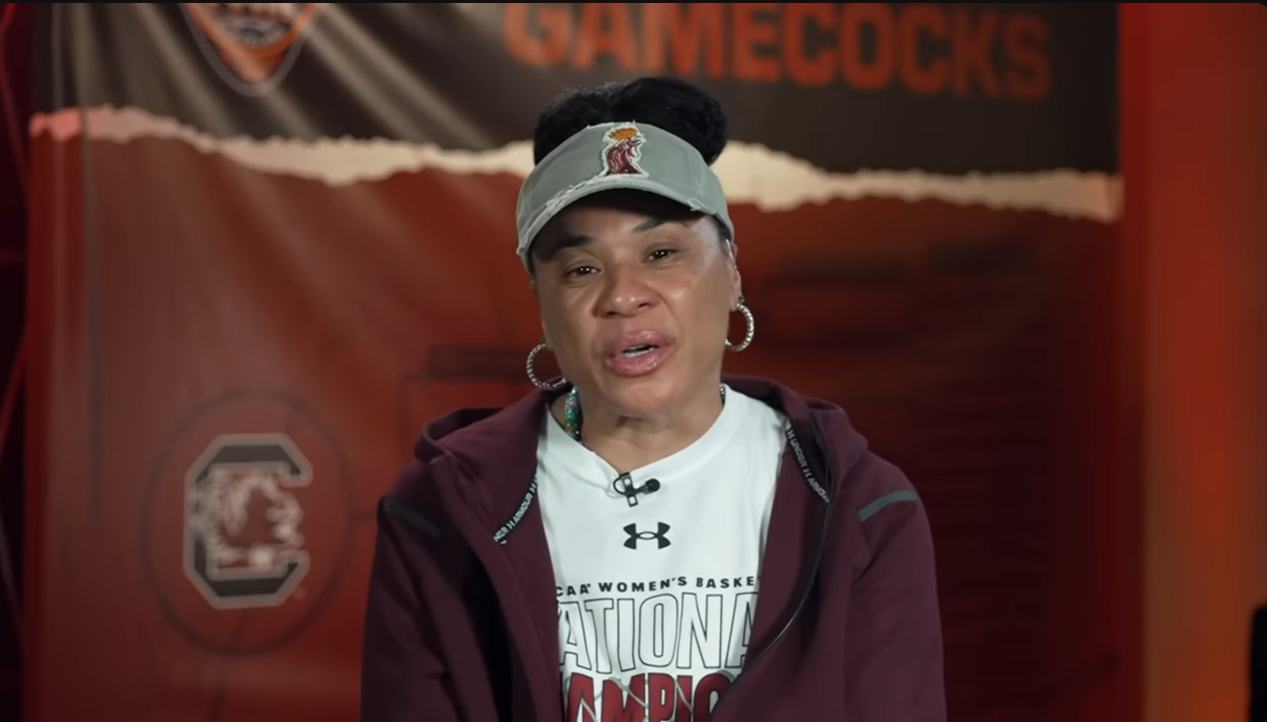
If not for a conservative transphobic blogger, this moment should be a celebration of NCAA women’s basketball coach Dawn Staley and the women of the South Carolina Gamecocks.
On Sunday, they concluded their undefeated season with a decisive win and a championship title. But when Staley faced reporters before that big game, Outkick’s Dan Zakheske asked her an irrelevant, clickbait question about transgender women in sports, referring to them as “biological males.”
Staley could have ignored the question, or stated she had no opinion, but instead the legendary coach offered a crystal clear endorsement of trans women competing in women’s sports, something outlawed in her home state of South Carolina for girls in kindergarten through college.
“I’m of the opinion,” said Staley, “If you’re a woman, you should play. If you consider yourself a woman and you want to play sports or vice versa, you should be able to play. That’s my opinion.”
Zakheske clearly wasn’t satisfied with that declaration of allyship and Staley swiftly cut him off.
“You want me to go deeper?” she asked.
“Do you think transgender women should be able to participate,” he started to say, when the coach stole the ball and took it downtown on a fastbreak. “That’s the question you want to ask? I’ll give you that. Yes. Yes. So, now the barnstormer people are going to flood my timeline and be a distraction to me on one of the biggest days of our game, and I’m okay with that. I really am.”
Staley is herself a Hall of Fame player a leading voice for diversity.
Reaction to her comments were swift, from LGBTQ rights organizations, athletes and inclusion opponents.
“Coach Staley simply spoke the truth that trans women are women and should play if they want,” said Sarah Kate Ellis, president and CEO of GLAAD, in a post on Instagram. “All of us can take a page from Coach Staley’s playbook as a sports leader and as a person of high integrity guided by faith, compassion and common sense.”
A White House pool reporter revealed President Joe Biden called Staley Sunday evening to congratulate her and the Gamecocks on their championship win. But it’s not clear if she and the president, an outspoken supporter of trans rights, discussed her remarks on trans athletes.
A number of Black leaders in the LGBTQ movement applauded Staley for taking a stand.
“Coach Staley has always been a trailblazer, but she’s also shown that true leadership is about advancing justice and equality for everyone,” said Human Rights Campaign President Kelley Robinson. “By expressing her full-throated support for transgender athletes’ inclusion in sports, she’s sending an important message — our shared humanity matters.
“Coach Staley showed courage and vulnerability, in choosing to answer the question and make a powerful statement of support for trans people on one of the biggest days and biggest stages in sports history,” said Kierra Johnson, executive director of the National LGBTQ Task Force, in a statement. “Not only does that make her a leader we can all aspire to like, it makes her a class act. She has etched her legacy in the history books with her play, her coaching, her heart and her smarts.”
In congratulating Staley on her championship title victory, Dr. David J. Johns, the CEO and executive director of the National Black Justice Coalition, also commended her for “her unwavering advocacy and support for transgender people in sports.”
“In a time when transgender athetes face unjust scrutiny, discrimination and exclusion from the National Association of Intercollegiate Athletics, her courage to speak truth to power and in support of inclusion and fairness sets a powerful example for us all, and is a testament to her integrity and compassion.”
The NBJC leader was referring to Monday’s announcement by the NAIA, the governing body of athletic programs at small colleges nationwide, voting 20-0 to essentially ban trans women from competing with other women beginning Aug. 1, as ESPN reported.
“It is a shocking and devastating development that the NAIA, an organization that has done so much to open doors, is now slamming those doors shut on transgender athletes,” said Sasha Buchert, Lambda Legal’s senior attorney and director of the organization’s nonbinary and trans rights project.
“Instead of standing up in support of transgender young people, the NAIA has simply turned its back on them — permanently depriving them of the benefits of competition. Would that they had the courage of victorious University of South Carolina women’s basketball coach Dawn Staley, who didn’t miss a beat in clarifying that transgender women should be able to play.”
However, praise for Staley’s stance was not universal.
Riley Gaines, failed former college swimmer and paid shill for the anti-inclusion organization, Independent Women’s Forum, called Staley “entirely incompetent or a sell-out” on Fox News. “Personally, I don’t think she believes what she said.”
Gaines has turned her fifth-place tie with out trans NCAA champion Lia Thomas into a career as a crusader against inclusion and a former advisor to the presidential campaign of Florida Gov. Ron DeSantis.
Val Whiting, a former Stanford University and professional women’s basketball player, tweeted her strong disagreement with Staley. “A lot of my basketball sisters feel differently but trans women do not belong in women’s sports. It’s not fair nor safe for biological women. There has to be another solution for trans women to be able to compete athletically besides having them compete against biological women.”
A lot of my basketball sisters feel differently but trans women do not belong in women’s sports. It’s not fair nor safe for biological women. There has to be another solution for trans women to be able to compete athletically besides having them compete against biological women.
— Val Whiting (@iamcoachval) April 7, 2024
Zaksheske’s Outkick colleague, anti-trans pundit David Hookstead, also went all-in with a transphobic post.
“Dawn Staley says she supports men who identify as women competing against real women in sports. Her view could literally destroy women’s basketball forever. Why won’t more people stand up for women?”
Dawn Staley says she supports men who identify as women competing against real women in sports.
— David Hookstead (@dhookstead) April 6, 2024
Her view could literally destroy women’s basketball forever.
Why won’t more people stand up for women? pic.twitter.com/2A59KTqvHb
Hookstead then boasted that Staley blocked his account.
Republican South Carolina Congresswoman Nancy Mace retweeted Zaksheske’s account of his interaction with Staley, calling her support of trans athletes “absolute lunacy.” That in turn won praise from Caitlyn Jenner, who retweeted Whiting and posted her thanks to Mace, along with this comment: “There is nothing complicated about this issue!”
What is complicated is that Jenner has never explained why she has competed with cisgender women in golf ever since her transition almost a decade ago.
You’re a hypocrite. pic.twitter.com/42DKwA9jmF
— Art Candee 🍿🥤 (@ArtCandee) April 7, 2024
-

 State Department3 days ago
State Department3 days agoState Department releases annual human rights report
-

 Maryland4 days ago
Maryland4 days agoJoe Vogel campaign holds ‘Big Gay Canvass Kickoff’
-

 Politics3 days ago
Politics3 days agoSmithsonian staff concerned about future of LGBTQ programming amid GOP scrutiny
-

 District of Columbia17 hours ago
District of Columbia17 hours agoCatching up with the asexuals and aromantics of D.C.











